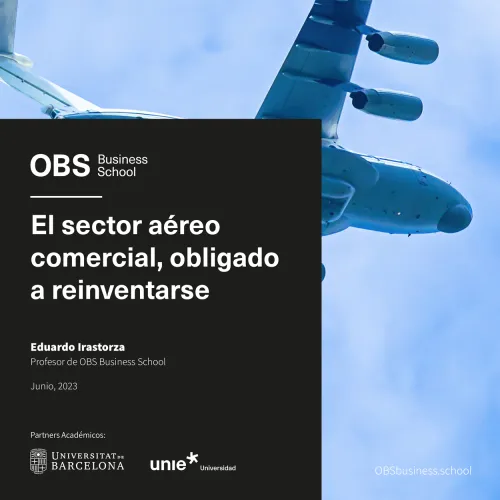
OBS Report: Commercial airline industry forced to reinvent itself
Air fares are set to rise sharply in the coming months
- Western airlines lead the ranking in profits, flight volume and market value, but Asian countries are expected to overtake us soon.
- High inflation could lead to significant losses for the industry as customers are unable to afford the forced fare hikes.
- For the West to compete with the East will require new alliances and mergers and an orderly and decisive renewal of the European fleet.
- Industry seeks to reduce carbon dioxide emissions for environmental reasons.
OBS Business School publishes the report El sector aéreo comercial, obligado a reinventarse, directed by Professor Eduardo Irastorza.
The aerospace industry is one of the few prestigious sectors where Europe maintains an important position in the global economy, but competition is growing and is no longer limited to the US. China is now the country with the highest volume of domestic travel and the most advanced technology. In this context, the EU finds it difficult to renew its fleets, not only because of a lack of budget, but also because of the cost of developing and implementing new and very expensive clean engines.
The different countries in Europe seem to prioritise other issues, as France has demonstrated by restricting the number of ‘short-haul’ flights, i.e. flights of less than two and a half hours. Professor Irastorza writes: "Behind this apparently green policy, one can recognise Paris’ interest in projecting its powerful railway industry and its high-speed commercial offer in a liberalised market, boosting its domestic tourism in the process". Meanwhile, the International Air Transport Association (IATA) has announced that airlines will no longer be able to offer their services in countries that do not allow them to repatriate their profits (Nigeria $812.2 million, Bangladesh $193.3 million, Pakistan $188.2 million and Lebanon $141.2 million), calling on governments to work with the industry to resolve the situation. Added to this is high inflation, which could push the industry into a loss as customers are unable to afford the forced tariff hikes.
The rise of Asian companies
To this day, Western airlines continue to lead the ranking in terms of profits, flight volume and market value. US carrier Delta Airlines is the world's most profitable airline, thanks mainly to its domestic North American flights, which account for a huge proportion of its profits. Fourth place in the ranking goes to Europe's Lufthansa, which has significantly improved its management efficiency.
However, the current ranking of airlines will undergo significant changes, the report says. As Statista Research Department's ranking of the world's largest commercial airlines by revenue indicates, there are already two Chinese carriers in the top ten. They are the new giant China Southern Airlines and China Airlines. "There is no doubt that in order to compete in the immediate future with the highly intervened Chinese market, companies from Western countries will have to have more decisive and coordinated support from their respective governments", says Eduardo Irastorza, professor at OBS Business School. The truth is that a polarisation of supply is taking place, with future options only for low-cost and premium airlines. The rest have it very difficult.
The future of sustainable flight
Air transport is one of the main sectors that also contributes to global warming. As Professor Eduardo Irastorza points out: "The biggest challenge is to eliminate carbon dioxide emissions, not only for environmental reasons, but also to calm the pressure of public opinion, which in Europe is by far the most aware and mobilised in the world in the fight against climate change". This involves the use of what is known as SAF (Sustainable Aviation Fuel), which is much cleaner than traditional fuel. To achieve zero emissions today, 23 billion litres of this fuel would be needed, and by 2050 this figure will rise to 449 billion litres.
The airlines that are making the most effort to incorporate clean fuels into their fleets by purchasing millions of gallons of sustainable aviation biofuel are, according to Statista data, US carriers United Airlines and Delta, followed by OneWorld and Europe's Lufthansa Group and Air France.
The report indicates that the European fleet must also be renewed in an orderly and decisive manner in order not to lose market positions and that, to this end, the protection and defence of this industry, which represents an important part of European GDP, is vital. "It would be a guarantee of political and operational independence in times of serious international geopolitical tension such as those we are currently experiencing", says Professor Irastorza, who also considers it necessary to fight to retain within European borders the highly qualified professional talent that we have worked so hard to create. Moreover, conquering direct contact with the customer, or ‘Front Line’, would translate into loyalty and new sources of income.
Asian skies are expected to be the most densely populated by commercial aircraft due to their huge population density (India and China each have more than 1.4 billion people) and economic growth, which will outpace the West. Indonesia and the Philippines are two other overpopulated and dynamic nations, and Africa and Latin America will also see significant growth in passenger numbers.
The valuation of airlines
Global passenger numbers are still far from pre-pandemic levels and the same can be said of the number of flights, which are at levels comparable to five years before the pandemic. Those countries with the largest domestic markets, such as the United States and China, will overcome the downturn first.
Eastern airlines are the ones currently receiving the highest customer ratings. Emirates, Japan Airlines, Qatar Airways and the much-admired and well-established Singapore Airlines are at the top of the list by reinventing the concept of the ‘pleasure of flying’ with a multi-sensory and personalised offer managed by the most qualified professionals, who make a great effort in terms of creativity, calculation and negotiation with suppliers and other companies. We are talking about a 3.0 scenario in which personalisation must be taken to the extreme through the most advanced Big Data tools. On the other side of the coin are the low-cost companies, whose future is being jeopardised by the unbridled rise in fuel prices.
The aviation sector in Spain today
Adolfo Suárez-Madrid Barajas airport alone had an air traffic last year of no less than 50 million passengers on more than 350,000 flights (still far from the more than 61 million passengers recorded the year before the pandemic). Barcelona received 41 million, the Canary Islands more than 30 million and the Balearic Islands nearly 37 million.
Nevertheless, recovery is underway. The sector in Spain has a high average level of quality, one of its great strengths, with the vast majority of airlines under public ownership, unlike other countries in the region. According to Eduardo Irastorza, "this situation will probably change in the future if Europe implements new liberalisation measures in the sector".
The cheapest airlines are the ones that operate the largest number of flights in our country: Ryanair with more than 28 million passengers and Vueling with more than 22 million. Foreign airlines operating in Spain account for 59% (41% of which are European), while the 17 Spanish airlines represent the other 41%, which speaks very positively of the excellence, competitiveness and dynamism of our airlines, headed by Iberia and Vueling.
The rise in fares
The OBS report predicts that fares will rise sharply in the coming months, although these increases will differ from region to region around the world. Intercontinental flights to and from Asia will see by far the largest increases. On the other hand, those flights connecting the Far East with Europe will increase their fares by no less than 12% in economy class and 7% in business class. Flights between Europe and North America will see a smaller increase of around 3.7%.
European airlines, more sensitive to the energy crisis than North American airlines, will increase fares in economy class by up to 5.5% and up to 6% in business class, and the industry, as always, will need government support to overcome the recession.
Written by:
Carmen García-Trevijano
OBS Business School Press Office

